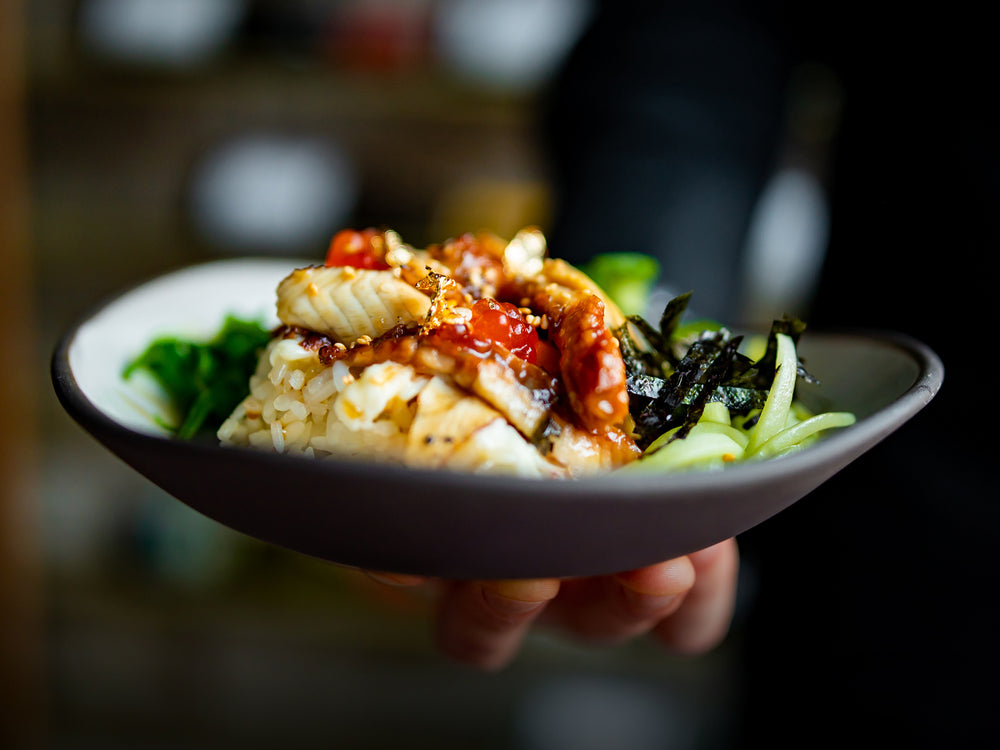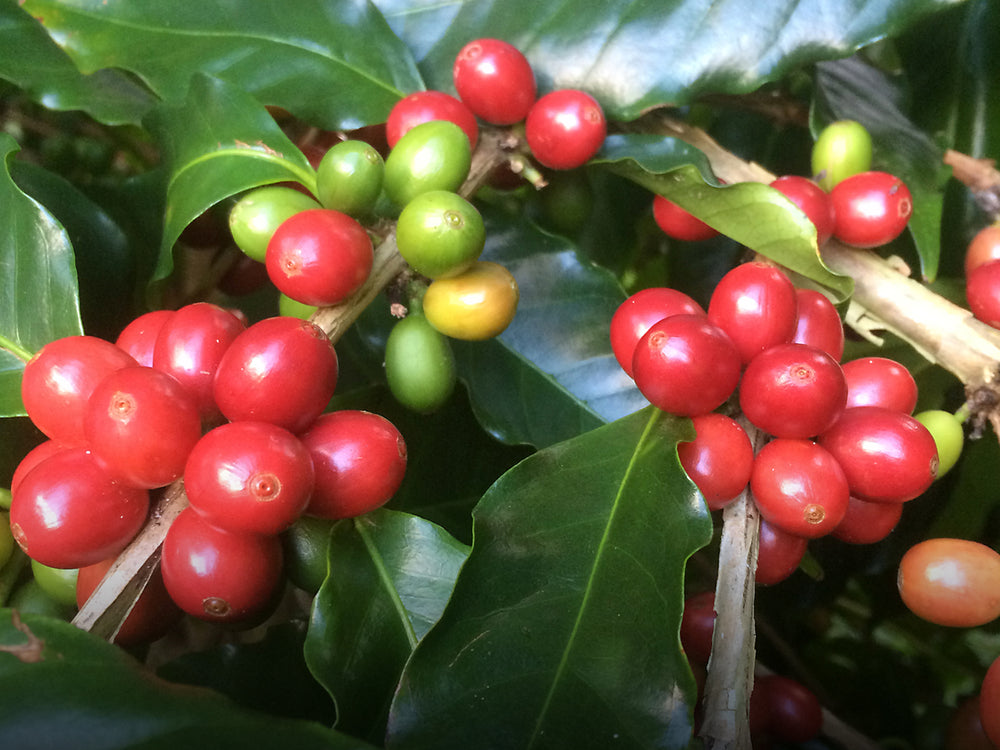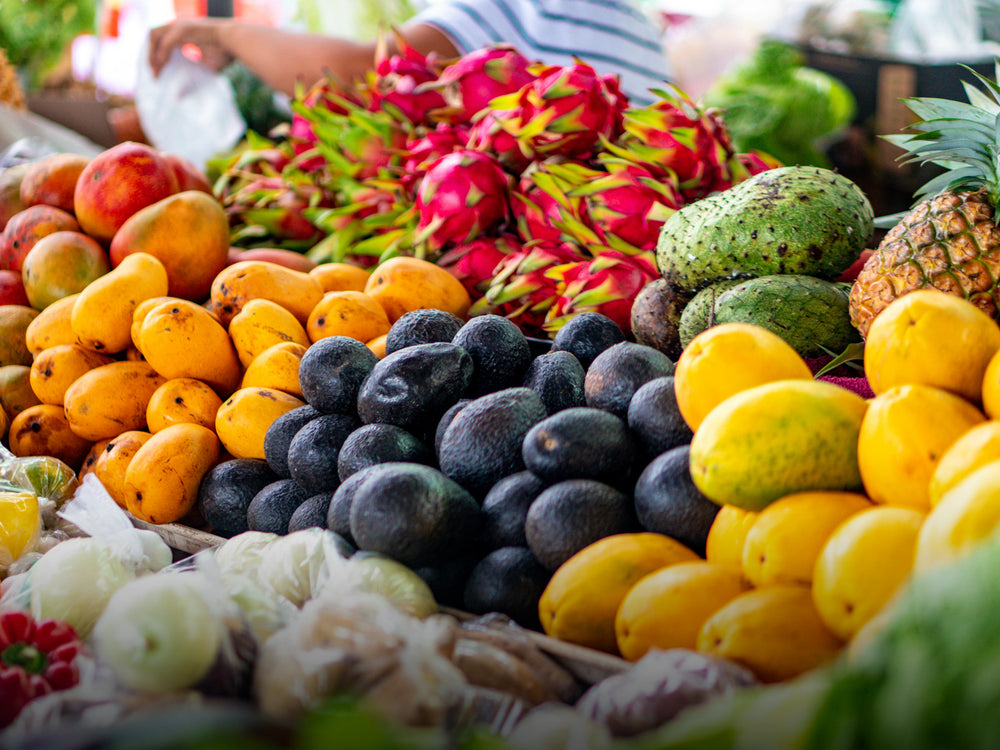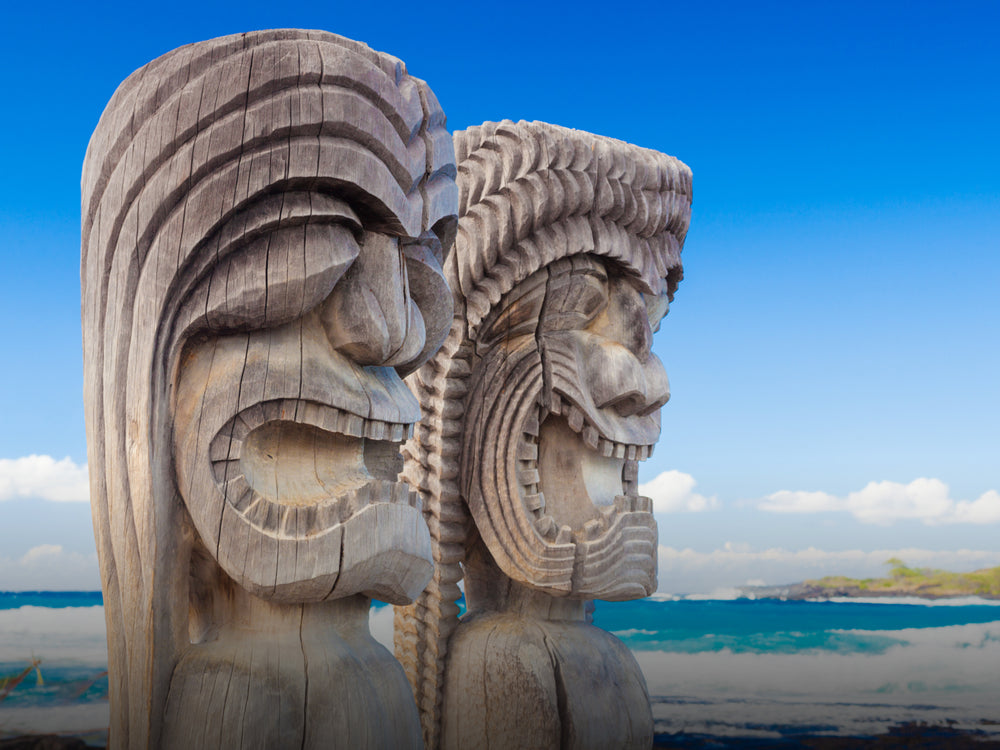The Future Continues to Brighten for 100% Kona Coffee
by Les Drent
With the final chapter being written in the fraudulent Kona coffee case; a state wide Hawaii Coffee association gaining momentum and planted acreage in Kona continuing to rise; farmers, millers, roasters and retailers of 100% Kona coffee have much to look forward to. Add to that an aggressive coffee growing research program that is being conducted by the University of Hawaii and the increasing popularity of Kona coffee a bright future seems to be at hand. But like any successful venture, this nearly 175 year old industry still has much to improve to strengthen its future.

Left: Hoshidana (roll away roof system used for drying coffee) at Bay View Farm. Right: A flat of coffee starts. A flat this size holds between 600-900 coffee starts which is enough to plant an acre of coffee trees.

A coffee tree bearing ripe coffee cherries.
Perhaps the happiest news of the Summer came when the case involving Kona Kai Farms and their multimillion dollar fraudulent Kona coffee scheme neared a conclusion in the Federal Building in Oakland, California. After several years of negative national media attention that seriously tarnished the credibility and reputation of 100% Kona coffee, Michael Norton of Kona Kai Farms recently plead guilty to one count of wire fraud and one count of tax evasion.
On the following page is an excerpt from the July 14, 2000, U.S. Department of Justice press release.
Beyond the protection of 100% Kona coffee the industry continues to grow at a rapid rate. This growth however is also changing the faceof the local farms. Many of the new plantings are the result of large scale growers planting anywhere from 50 to 100 acre estates. For the past 100 years Kona coffee production has been the result of many small farms ranging from 1-10 acres. During much of the 1800's several large coffee operations controlled the majority of coffee lands in Kona but with the crash of the coffee market in the early 1900's much of the land was leased or sold to families who earlier emigrated to Hawaii from Japan. These early Japanese first worked in the sugar industry before establishing themselves in Kona to avoid the harsh working and living conditions offered on the sugar plantations. A cooperative effort throughout the years with local mills to buy, process, and sell the prized crop has been a way of life for many in Kona. In most cases coffee farming has served to only supplement a family's income and much of the work was done after working normal jobs. While opinions are scattered, some in Kona view the rise of larger coffee estates as a means to strengthen the relationship between small farmers and local mills as both realize the importance each other plays in their continued overall success. Some are also taking to the street to peddle their own coffee in the retail marketplace. All in all the operation of the Kona coffee industry is as diverse as it has ever been.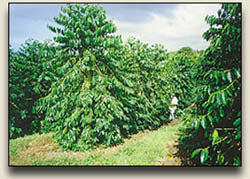
A coffee orchard.
Also contributing to the success of all coffee production not only in Kona but in the other coffee producing islands is the Hawaii Coffee Association. It may surprise some, but for many in Kona a new coffee organization is nothing new. Over the years several groups including the Kona Coffee Council and the Kona Coffee Farmers Cooperative were created to deal with issues confronting the industry. Few organizations however have maintained positive growth and successfully pulled together all members of the coffee growing community in Hawaii. Many are hoping that the new Hawaii Coffee Association will serve to further improve the relations among allfactions of the Hawaiian coffee industry.

Left: Alex Hedger of Greenwell Farms carefully watches over coffee as it passes over a gravity table. 100% Kona coffee is graded by size and density of bean. Right: A 100 pound bag of high grade Extra Fancy coffee is filled at the Captain Cook Coffee Company dry mill in Kainaliu.

Roast master Kurt Penrose of Greenwell Farms finishes a batch of fresh roasted 100% Kona coffee.
The Hawaii Coffee Association just celebrated the fifth anniversary of its annual coffee conference in Kona this past July. Once again the conference and trade show served as a useful tool to improve many issues revolving around the local coffee industry. The daily trade show exhibited everything from coffee processing, roasting, and packaging equipment while hourly lectures tackled issues relating to the marketing and farming of coffee in Hawaii. Other activities included several social gatherings that brought together farmers, millers, roasters and marketers from all the islands. Many agree that outside the very applicable programs that dealt directly with industry issues, the conference was simply a great time to catch up and share inside opinions of coffee production in Hawaii.
A woman picks coffee above Kainaliu town
One serious issue discussed during a lecture given by Mario Serracin of the University of Hawaii covered the effect of microscopic pests known as nematodes on coffee production in Kona and throughout Hawaii. An ongoing study being conducted by Dr. Donald Schmitt, and Mario Serracin of the University of Hawaii is attempting to offer solutions to combat these root-knot nematodes which if not controlled have the ability to wipe out entire orchards of coffee. Studies have shown that the effects of these nematodes have resulted in not only lower yields but wilting, chlorosis, galling, root-rot and ultimately tree death. In serious cases trees that can normally sustain healthy growth for over 75 years can die after only 5 years from time of planting.
While the first documentation of nematodes came in 1907 when they were detected in tobaccoplantings in Hawaii it was in1982 that a problem of nematodes was detected in coffee. From 1994 to present a scientific study has yielded important information into the ecology - life cycle of root-knot nematodes. Now that identification and studies of this species have taken place several tests are being conducted by the University of Hawaii specialists in an attempt to learn more about controlling the nematode problem not only in Kona but other Hawaiian Islands as well.
Luis Cisneros of Bay View Farm transports fermented coffee to the drying decks.
It is now known that several initiatives can be taken by farmers to control the spread of nematodes throughout the farmlands, one being the start of trees from seed in sterile soil rather than the "pulla pulla" method in which young coffee plants are pulled out of the ground and replanted. This practice alone will greatly control the spread of nematodes throughout orchards. It is also believed that the timing and frequency of irrigation and fertilization plays an important role in the reduction of nematode populations. It has been documented that nematode production increases in overly irrigated fields. To further this clean start of coffee tree growth it is recommended that clean and sterile soil be used to start coffee plants. This can be accomplished in two ways. The first, a more expensive but foolproof way, would be to simply buy bagged soil that has been sterilized. A second more affordable but labor intensive way would be to sterilize the soil by cooking it. This is commonly accomplished in South and Central America by cooking soil in 50 gallon drums over an open fire while turning for a period of two hours.
Cuppers cup 100% Kona coffee at the annual Kona Coffee Festival.
Perhaps the most revolutionary solution to the nematode crisis may come in the special grafting of Kona coffee cuttings onto root systems of African coffee trees. The root systems of these African coffee trees have proven resistant to nematodes. While many are skeptical about the effects this might have on the taste of Kona coffee, University of Hawaii horticulturists and expert coffee cuppers, Skip Bittenbender and Kathy Cavaletto, say that preliminary coffee cupping tests show that no difference in taste has been recognized. Knowing full well that the Kona coffee farmers are the true judge and jury of the Kona taste, a full and comprehensive cupping will take place later this year by discriminating members of the Kona coffee industry.
Romeo Ladore in the foreground and Justin Pitts in the background of Greenwell Farms pulp freshly picked coffee cherry.
All in all the Hawaii Coffee Association is proving to be a useful and beneficial organization to aid all facets of the Hawaiian coffee industry. For more information about next year's conference or to become a member of the Association, interested people are encouraged to visit the association's web site at: www.hawaiicoffeeassoc.org
An ongoing effort continues to support the protection of 100% Kona coffee; acreage is on the rise; and the alliance between small farmers and mills in Kona is being strengthened. Everyone is hoping for sustainable coffee prices and looking forward to a very successful 2000-2001 coffee season.
The United States Attorney's Office for the Northern District of California announced today that Michael L. Norton pleaded guilty to one count of wire fraud and one count of tax evasion. Mr. Norton, 52, a Berkeley resident, was indicted by a federal Grand Jury on April 16, 1998 for multiple counts of wire fraud, money laundering and tax evasion.
The charges stem from an elaborate scheme perpetrated by Norton during 1993-1995 to defraud businesses and consumers who purchased coffee from his business believing it to be 100% Kona coffee from Hawaii when, in fact, the coffee was significantly cheaper coffee from Central America. During the period 1993 through 1996, Norton purchased approximately 3.6 million pounds of Central American coffee. By sorting the Central American coffee to size, re-bagging, and then relabeling it as "pure Kona Coffee", Mr. Norton was able to generate profits substantially greater than he would have if he had not misrepresented the product as Kona coffee. The government contends that those additional profits exceeded $10 million.
In the years 1995 and 1996, Mr. Norton diverted approximately $1.3 million of his fraudulent coffee sales proceeds to a personal Swiss bank account. He failed to report these proceeds as income on his 1995 personal income tax return.
As part of the plea agreement entered in the case, Norton has agreed to forfeit to the government approximately $2 million which the government seized at the time Norton was first charged as well as another $1.3 million which Norton had placed in his Swiss bank account in order to avoid paying income taxes.
The sentencing of Mr. Norton is scheduled for October 20, 2000 at 10 a.m. before Judge D. Lowell Jensen in the Oakland Federal Courthouse. The maximum statutory penalties for each of the wire fraud and tax violations to which Norton pleaded guilty are; five years imprisonment; 3 years supervised release; a fine of $250,000 and a special assessment of $100. In addition, the wire fraud charge also requires that Norton make restitution for losses suffered by his customers.
The prosecution is the result of a lengthy investigation of Mr. Norton by Special Agents of the U.S. Customs Service, the Internal Revenue Service, and the Contra Costa County Sheriff's office. The prosecution was handled in court by Assistant U.S. Attorneys Laura E. Gonzales and Ben Burch with the assistance of Letty Whitworth.
All press inquiries to the U.S. Attorney's Office should be directed to Assistant U.S. Attorney Matt Jacobs at (415) 436-7181.
Readers may submit editorial comments to any of our stories by sending an email to les@lbdcoffee.com. We would be happy to attach your comments and feedback to anything we publish online. Thank you for your interest.
Story appeared originally in Coffee Times print magazine and appears online for archival purposes only. Any use or reprinting of these stories without the expressed written consent of the author is prohibited.




